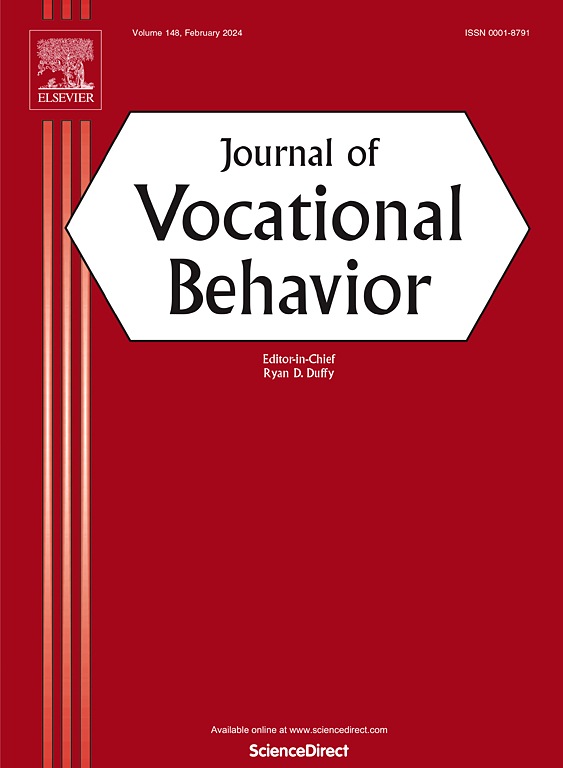Living a calling despite the challenges of the gig economy? The role of meaning-making and work alienation
IF 5.2
1区 心理学
Q1 PSYCHOLOGY, APPLIED
引用次数: 0
Abstract
This article aims to shed light on the diverse career experiences of gig workers by investigating the relationship between gig work challenges and living a calling. Drawing from the Job Demands-Resources (JD-R) theory and the Work as Calling Theory (WCT), we conceptualize gig work challenges as hindrance demands which can potentially undermine individuals' sense of living a calling through a health impairment process mediated by work alienation. Beyond that, we look at meaning-making as a personal resource that can buffer negative effects of hindrance demands for living a calling. In a three-wave time-lagged sample of 723 gig workers that work through online labor platforms (OLPs), we investigated the relationship between gig work challenges and living a calling. We found that gig work challenges were negatively related to living a calling. This relationship was fully mediated by work alienation. Furthermore, we found that meaning-making buffered the effect of these challenges on living a calling through work alienation. The results support the idea that hindrance demands are negatively related to living a calling and that the way individuals cope with hindrances plays an important role in maintaining a sense of living a calling. We discuss the implications of these findings for the WCT and reflect on its relevance for our understanding of subjective career success in the context of the gig economy.
尽管面临零工经济的挑战,但仍坚持自己的职业?意义制造与工作异化的作用
本文旨在通过调查零工挑战与生活使命之间的关系,揭示零工工人的不同职业经历。根据工作需求-资源(JD-R)理论和工作作为使命理论(WCT),我们将零工工作挑战定义为障碍需求,这种需求可能会通过工作异化介导的健康损害过程破坏个人的生活使命感。除此之外,我们把意义创造看作是一种个人资源,可以缓冲生活使命的障碍需求的负面影响。在723名通过在线劳动平台(olp)工作的零工工人的三波时差样本中,我们调查了零工工作挑战与生活使命之间的关系。我们发现零工工作的挑战与生活的使命是负相关的。这种关系完全被工作异化所中介。此外,我们发现意义制造通过工作异化缓冲了这些挑战对生活召唤的影响。研究结果支持了障碍需求与“活出使命”负相关的观点,个人应对障碍的方式在维持“活出使命”感方面起着重要作用。我们讨论了这些发现对WCT的影响,并反思了它与我们理解零工经济背景下主观职业成功的相关性。
本文章由计算机程序翻译,如有差异,请以英文原文为准。
求助全文
约1分钟内获得全文
求助全文
来源期刊

Journal of Vocational Behavior
PSYCHOLOGY, APPLIED-
CiteScore
13.10
自引率
5.40%
发文量
85
期刊介绍:
The Journal of Vocational Behavior publishes original empirical and theoretical articles offering unique insights into the realms of career choice, career development, and work adjustment across the lifespan. These contributions are not only valuable for academic exploration but also find applications in counseling and career development programs across diverse sectors such as colleges, universities, business, industry, government, and the military.
The primary focus of the journal centers on individual decision-making regarding work and careers, prioritizing investigations into personal career choices rather than organizational or employer-level variables. Example topics encompass a broad range, from initial career choices (e.g., choice of major, initial work or organization selection, organizational attraction) to the development of a career, work transitions, work-family management, and attitudes within the workplace (such as work commitment, multiple role management, and turnover).
 求助内容:
求助内容: 应助结果提醒方式:
应助结果提醒方式:


